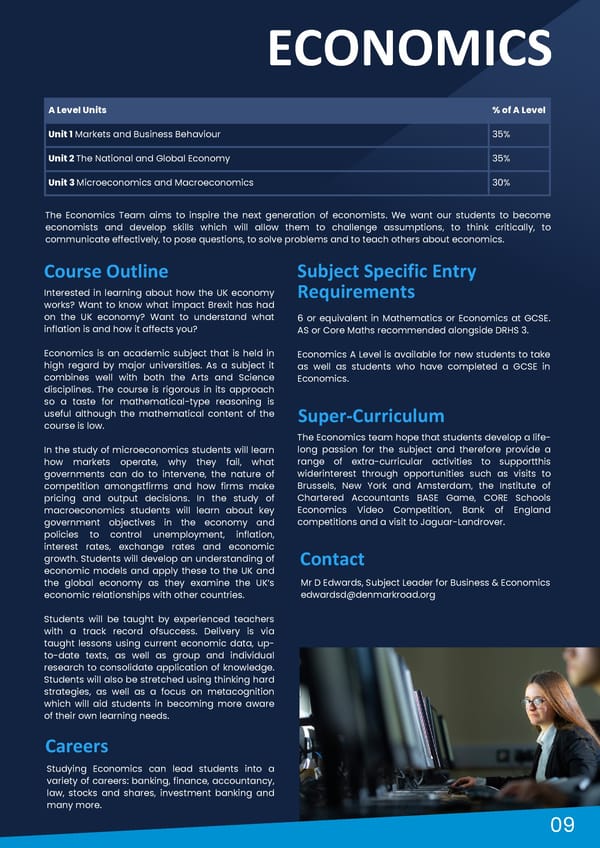CORE MATHEMATICS ECONOMICS A Level Units% of AS LevelA Level Units % of A Level Unit 1 Markets and Business Behaviour 35% Paper 1 Data Analysis, Finance, Estimation & Modelling(1.5 hours, 60 marks) 50% Unit 2 The National and Global Economy 35% Paper 2A Statistical Techniques(1.5 hours, 60 marks) 50% Unit 3 Microeconomics and Macroeconomics 30% This is a Level 3 qualification which is equivalent to an AS qualification. It is designed to run alongside 3 A LevelsThe Economics Team aims to inspire the next generation of economists. We want our students to become to develop student’s mathematical skill-set beyond GCSE and to support the Maths content embedded withineconomists and develop skills which will allow them to challenge assumptions, to think critically, to their other subjects.communicate effectively, to pose questions, to solve problems and to teach others about economics. Subject Specific Entry Course OutlineCareersCourse Outline Studying Core Maths helps students developCore Maths has been designed with the support andInterested in learning about how the UK economy Requirements their quantitative and problem-solving skills.help of employers and universities to suit students withworks? Want to know what impact Brexit has had There is a strong focus on mathematicala range of grades at GCSE mathematics and provideon the UK economy? Want to understand what 6 or equivalent in Mathematics or Economics at GCSE. reasoning and the practical application ofthem with the quantitative skills needed in a wideinflation is and how it affects you? AS or Core Maths recommended alongside DRHS 3. mathematics and statistics. It enables studentsrange of jobs. It is valuable preparation for the to use mathematics to deepen theirquantitative skills needed for many degree and higher-Economics is an academic subject that is held in Economics A Level is available for new students to take understanding of the world around them and todegree apprenticeship courses, particularly subjectshigh regard by major universities. As a subject it as well as students who have completed a GCSE in support them to make the best decisions.such as Psychology, Geography, Business-relatedcombines well with both the Arts and Science Economics. Success in Core Maths depends on studentscourses, Sports and Social Sciences, and Naturaldisciplines. The course is rigorous in its approach committing to learning through collaborationScience courses that do not require AS/A Mathematics.so a taste for mathematical-type reasoning is and problem solving – both vital for futureMany universities and apprenticeships are offeringuseful although the mathematical content of the Super-Curriculum studies and work. lower grade requirements to students wanting to studycourse is low. The Economics team hope that students develop a life- one of these subjects who have gained a Core Maths long passion for the subject and therefore provide a The main content of Core Maths includes: qualification. In the study of microeconomics students will learn range of extra-curricular activities to supportthis how markets operate, why they fail, what widerinterest through opportunities such as visits to Financial MathsA Level subjects such as Biology, Psychology,governments can do to intervene, the nature of Brussels, New York and Amsterdam, the Institute of Statistics & ProbabilityGeography, Economics, Business Studies and P.Ecompetition amongstfirms and how firms make Chartered Accountants BASE Game, CORE Schools Critical Analysisrequire application of Mathematics to their subjectspricing and output decisions. In the study of Economics Video Competition, Bank of England Modelling using spreadsheets with a range of 10 – 20% of their specifications includingmacroeconomics students will learn about key competitions and a visit to Jaguar-Landrover. EstimationMaths skills. Core Maths willsupport progress andgovernment objectives in the economy and attainment within these subjects. In a nutshell…Corepolicies to control unemployment, inflation, With this course we have the flexibility to createMaths will help to open many doors to your future! interest rates, exchange rates and economic personalised pathways for students to ensuregrowth. Students will develop an understanding of Contact the topics they cover are linked to their othereconomic models and apply these to the UK and Mr D Edwards, Subject Leader for Business & Economics subjects. Students who have future interests inthe global economy as they examine the UK’s [email protected] Computing, Economics and Business will haveeconomic relationships with other countries. Super-Curriculum the opportunity to deepen their understanding of concepts such as modelling and critical pathStudents will be taught by experienced teachers We run a KS5 Maths trip to Florence or Athens at analysis, whilst students with a passion for areaswith a track record ofsuccess. Delivery is via October half term. involving data analysis will have the opportunitytaught lessons using current economic data, up- to focus more on application of statistics. Coreto-date texts, as well as group and individual There will be opportunities to attend STEM inspiration Maths will be studied in a single year, examinedresearch to consolidate application of knowledge. lectures and take part in STEM competitions through in May of Year 12 and can be taken alongsideStudents will also be stretched using thinking hard the year. three A levels. strategies, as well as a focus on metacognition which will aid students in becoming more aware of their own learning needs. ContactSubject Specific Entry Careers Miss M Adamson, Subject Leader for Mathematics Requirements Studying Economics can lead students into a [email protected] variety of careers: banking, finance, accountancy, 5 or equivalent in Maths at law, stocks and shares, investment banking and GCSE. many more. 08 09
 Subject Guide (Sixth Form) Page 10 Page 12
Subject Guide (Sixth Form) Page 10 Page 12